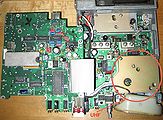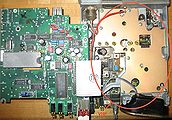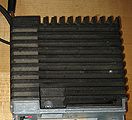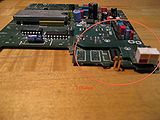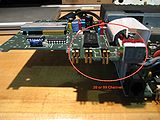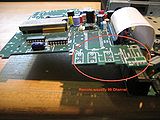EF Johnson Challenger Series Information
EF Johnson Series Radio Information
these are very versatile radios, they will easily move into the ham bands VHF and UHF models. The logic boards can be swapped between models and reprogrammed so that you can make a 2 Channel VHF a 99 channel by just replacing the logic board and reprogramming. The boards between UHF and VHF are fully interchangeable. I have also converted non-remote models to remote and vice versa. Converting Dash Mount EF Johnson Challenger Radios to Remote Mount
Model Number Decoding
In a posting on the EFJ yahoogroup a gentleman reported that the model numbers in the 71xx series of Challengers were organized such that: The VHF units were 715x and 716x (the 5x were 1st generation and 6x were 2nd generation)
The UHF units were 717x and 718x (the 7x were 1st generation and 8x were 2nd generation)
- 7151
- Band: VHF
- Channels: 2 Channel
- Output: 25 Watts
7152
- Band: VHF
- Channels: 8 Channel
- Output: 25 Watts
7153
- Band: VHF
- Channels: 2 Channel
- Output: 40 Watts
7154
- Band: VHF
- Channels: 8 Channel
- Output: 40 Watts
7155
- Band: VHF
- Channels: 20 Channel
- Output: 40 Watts
7156
- Band: VHF
- Channels: 99 Channel
- Output: 40 Watts
7157
- Band: VHF
- Channels: 99 Channel
- Output: 100 Watts
7161
- Band: VHF
- Channels: 2 Channel
- Output: 25 Watts
7162
- Band: VHF
- Channels: 8 Channel
- Output: 25 Watts
7163
- Band: VHF
- Channels: 2 Channel
- Output: 40 Watts
7164
- Band: VHF
- Channels: 8 Channel
- Output: 40 Watts
7165
- Band: VHF
- Channels: 20 Channel
- Output: 40 Watts
7166
- Band: VHF
- Channels: 99 Channel
- Output: 40 Watts
7167
- Band: VHF
- Channels: 99 Channel
- Output: 100 Watts
7171
- Band: UHF
- Channels: 2 Channel
- Output: 15 Watts
7172
- Band: UHF
- Channels: 8 Channel
- Output: 15 Watts
7173
- Band: UHF
- Channels: 2 Channel
- Output: 35 Watts
7174
- Band: UHF
- Channels: 8 Channel
- Output: 35 Watts
7175
- Band: UHF
- Channels: 20 Channel
- Output: 35 Watts
7176
- Band: UHF
- Channels: 99 Channel
- Output: 35 Watts
7177
- Band: UHF
- Channels: 99 Channel
- Output: 80 Watts
7181
- Band: UHF
- Channels: 2 Channel
- Output: 15 Watts
7182
- Band: UHF
- Channels: 8 Channel
- Output: 15 Watts
7183
- Band: UHF
- Channels: 2 Channel
- Output: 35 Watts
7184
- Band: UHF
- Channels: 8 Channel
- Output: 35 Watts
7185
- Band: UHF
- Channels: 20 Channel
- Output: 35 Watts
7186
- Band: UHF
- Channels: 99 Channel
- Output: 35 Watts
7187
- Band: UHF
- Channels: 99 Channel
- Output: 80 Watts
The following numbers replace the x as mentioned above:
1 = 2 Channel 25 watts (VHF) 15 watts (UHF)
2 = 8 Channel 25 watts (VHF) 15 watts (UHF)
3 = 2 Channel 40 watts (VHF) 35 watts (UHF)
4 = 8 Channel 40 watts (VHF) 35 watts (UHF)
5 = 20 Channel 40 watts (VHF) 35 watts (UHF)
6 = 99 Channel 40 watts (VHF) 35 watts (UHF)
7 = 99 Channel 100 watts (VHF) 80 watts (UHF)
If it had a -5 after the number it was a remote mount system
Radio Identification by Images
you can easily identify the band of the radio by looking at the inside. the UHF has two small cover plates the the VHF has on large one.
Power output of the radio can be determined by the size of the rear heatsink. the max power is also determined by the band (UHF/VHF)
Determining the number of Channels
(I'm missing an 8 channel image, but its easy, it only has one digit)
